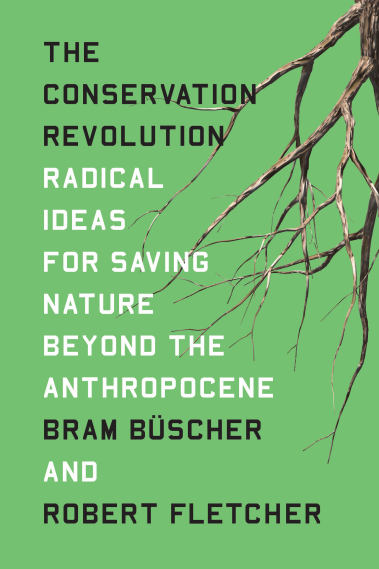Convivial Conservation is inspired by a new book by Bram Büscher and Robert Fletcher published by Verso Books: The Conservation Revolution: Radical Ideas for Saving Nature beyond the Anthropocene. It outlines the conceptual framework guiding the convivial conservation proposal and CONVIVA research project.
Get your copy here or via other major booksellers! See below for info on translations (German, French, Spanish).
Book Description
Conservation needs a revolution. This is the only way it can contribute to the drastic transformations needed to come to a truly sustainable model of development. The good news is that conservation is ready for revolution. Heated debates about the rise of the Anthropocene and the current ‘sixth extinction’ crisis demonstrate an urgent need and desire to move beyond mainstream approaches. Yet the conservation community is deeply divided over where to go from here. Some want to place ‘half earth’ into protected areas. Others want to move away from parks to focus on unexpected and ‘new’ natures. Many believe conservation requires full integration into capitalist production processes.
Building a razor-sharp critique of current conservation proposals and their contradictions, Büscher and Fletcher argue that the Anthropocene challenge demands something bigger, better and bolder. Something truly revolutionary. They propose convivial conservation as the way forward. This approach goes beyond protected areas and faith in markets to incorporate the needs of humans and nonhumans within integrated and just landscapes. Theoretically astute and practically relevant, The Conservation Revolution offers a manifesto for conservation in the twenty-first century—a clarion call that cannot be ignored.
Advance Praise
“The debate over the conservation of creation is necessarily deep and contentious–this new approach deserves a careful reading from everyone who cares about human and more-than-human nature!”
Bill McKibben, Author, Environmentalist and founder of 350.org
“In our era of unprecedented conservation needs and challenges, this hard-hitting, clear-sighted book offers a radical and timely way forward. Two eminent and committed political ecologists cut a path through old and new conservation debates and dichotomies—people vs. nature, capitalism vs. post-capitalism—to offer a new paradigm and politics around conviviality. Vital reading, and a vital manifesto for all concerned with how people and non-human natures can live well together.”
Melissa Leach, Director, Institute of Development Studies, University of Sussex
“Büscher and Fletcher significantly advance radical alternatives to mainstream conservation, especially by locating them within the need for systemic alternatives to capitalism (and hopefully by implication, though not explicitly stated, patriarchy). Their notion of convivial conservation, building on innovative traditions that have broken away from dominant notions of progress and development, helps envisage an end to the human domination of the earth, so desperately needed.”
Ashish Kothari, co-author with A. Shrivastava of Churning the Earth: The Making of Global India
“This book is a remarkable intellectual and political achievement, demonstrating nothing less than how to organize and practice revolutionary conservation beyond the Anthropocene, but within the ruins of uneven socio-ecological capitalist development. A razor-sharp analysis of conservation and how to politicize its futures.”
Erik Swyngedouw, University of Manchester
Book Reviews
“The Conservation Revolution is essential reading for any environmental or conservation professional interested in transformative change”
Environment, Development and Sustainability – review by Ruchi Patel
“This book presents a well-developed theoretical basis for a real conservation revolution”
Basic and Applied Ecology – review by Tina Heger
“The titular “Conservation Revolution” could not be more crucial, and not only because of the intersecting ecological and climate breakdowns and nuclear threat that conservationists have so far”
New Politics – review by Daniel Fischer
“Both rigorous and accessible … an important addition to revolutionary thought in political ecology”
Uneven Earth – review by Jordan Teicher
“An essential foundation for reconsidering the status quo”
BOMB magazine – review by Amelia Rina
“A thoughtful, gentle and comprehensive overview…will become a mandatory read in political ecology, environmental history and conservation courses everywhere”
Journal of Political Ecology – review by Alexander Dunlap
“In its careful and scholarly way, The Conservation Revolution is doing what Friedman exhorts us to do: it is leaving some ideas lying around, ready to be picked up when our assumptions suddenly collapse in the face of a new reality”
Damaris Zehner, Integrity of Life
“It gets under your skin and leaves you with a permanent itch to pursue environmental justice”
Read it Forward
“To what extent, or whether at all, you agree with Büscher and Fletcher, what is unavoidable, and for me as a biologist wonderfully refreshing, is the need for ‘deeper, more numerous and more radical connections between the sciences, particularly those natural and social sciences dedicated to the big environmental questions of our time.”
Jamie Walker, Oxford University Nature Conservation Society
“The most worthwhile parts of the book, however, are those that posit a need to bring a strong critique of capitalism back into the debate, along with, too, an absolute offensive against ‘productivism’.”
Tim Barton, Hastings Independent
“…the implications of the book are far-reaching indeed: there cannot be a revolution in conservation without a global revolution against capitalist power.”
Rogelio Luque-Lora, The Philosopher
“The Conservation Revolution was, for me, a refreshing read in bleak times. It struck the right balance between realism and hopeful optimism by putting forward ideas for conserving nature that do not simply imagine ways of being outside of capitalism, but that recognize the need to remedy capitalist conservation’s cumulative negative effects”
Ariadne Collins, Antipode
“I think this book was a great intro into the current state of conservation and a useful way to learn about the current fields of thought including some of their benefits and downsides. The numerous sources cited in the book create a jumping off point for further study in conservation movements and highlight exciting, new ideas in the realm of political ecology.”
John Potess
German translation

“Ein Quantensprung in der Naturschutzdebatte”
Reinhard Loske in Die Frankfurter Rundschau
